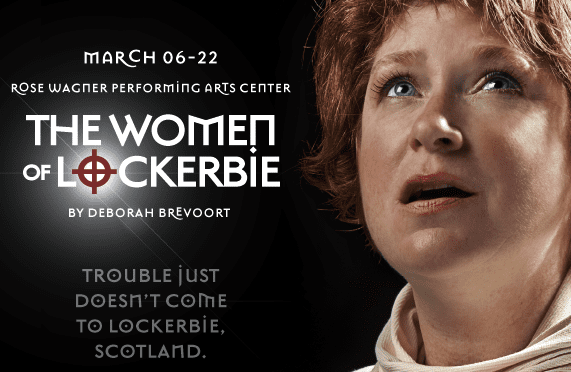SALT LAKE CITY — I believe that good theatre can change the world. I also believe that all theatre provides something to be learned from. Pygmalion’s The Women of Lockerbie aims to do both as it the aftermath of a terrorist attack.

I didn’t know about Pan American Flight 103 until I read about the show. I didn’t know any details about the event until I read the back of my program under fog curls and blue light while waiting for the show to begin. The script, by Deborah Brevoort, responds to the events of the bombing of Pan Am 103 in 1988, a crash that killed all 259 passengers and 11 residents of Lockerbie, Scotland, where the plane exploded. The bombing was considered an act of terrorism against the U.S. government and took years of international investigation to sort out. Meanwhile, 38 women in Lockerbie collected 11,000 articles of clothing from the crash to wash and return to victim’s families “turning an act of hatred into an act of love.”
The action takes place seven years after the crash and dually centers on grieving American parents Madeline (Dee-Dee Darby-Duffin) and Bill Livingston (Kent Hadfield) searching for peace and the local ladies’ quest to “free” the clothing from bureaucratic red tape. Darby-Duffin is gut-wrenching as a childless mother roaming the hills for just a bit of her lost son. Her loss and pain are always just tipped with hope, a pretty brutal combination to witness, but handled with gentleness so as not to become caricature. Hadfield portrays a stoic but equally lost father who has the dubious task of helping his wife and moving the story along. Though the plot forces him into unlikely situations and conversations, Hadfield shows Bill’s difficult steps from anger to acceptance with nuance and grace. Darby-Duffin and Hadfield are asked to show the Livingstons’ entire process through the seven stages of grief in a 90 minute production. This is a gargantuan request, but both actors are so clear with their emotional pilgrimage that I was able to accept it.
While Hadfield’s Bill is the character to ask the questions, the characters that answer them are the women of Lockerbie, specifically three that are a benevolent version of the weird sisters on the Scottish heath, parsing out information about how the crash affected Lockerbie in touching anecdotal scenes as well as odd poetic theatrical episodes. Stacy Rae Allen as Olive, Daisy Blake Perry as Fiona, and Marylynn Alldredge Eherengard as Greer guide both Bill and the audience through the “rolling hills” of Lockerbie in order to confront tragedy to gain peace. The trio are clear and caring, uttering lilting comfort whenever grief comes up. Allen carries the conflicted Olive through the most complete arc, showing the need to repair not only to help others but achieve her own closure.
As strong as the ladies are, the script contains vignettes that require these three to re-enact moments after the crash that are incongruent with the rest of tone of the piece and which director Fran Pruyn has punctuated with very theatrical movement that was even more disjointed and unspecific. Conflict in general is absent from the script, but is mostly represented by U.S. government official George Jones (Lane Richins). Jones is there to deal with the wreckage of the crash, and the Olive wants him to release the clothes to her and cohorts, which he is hesitant to do. Richins plays Jones as a man who just wants to do his job and get out, which works, but doesn’t support the extreme anger of some his later scenes with Olive and made the characterization come off as shallow and ungrounded. Allen and Darby-Duffin were similarly unmoored in a highly emotional scene they had together, which felt forced and slightly out of control. These moments were hard to watch, but perhaps that was the intent. In contrast, Vicki Pugmire provides a shining light of comic relief as Hattie. Hattie is the “inside woman” in Jones’s office and provides much more depth than the other characters were provided. Pugmire has a later responsibility as a messenger of great events which she delivers beautifully, but is unfortunately framed by more theatrical movement that detracted rather than enhanced the power of her words. I understood the purpose, but I question the execution.
Grief is an incredibly difficult subject to dedicate a story to. The repetitive nature of the text makes this even harder to buy into completely. On the whole, I felt Pruyn created a treatment that was respectful and kind, and the last five minutes are a beautiful and cathartic experience. John Wayne Cook’s literally picturesque set and Jesse Portillo’s evocative lighting provide an ethereal landscape for events to unfold. Michael Nielson’s costumes, in neutral shades and soft fabrics for the Scots and heavy, dark colors for the Americans, helped ground the action in reality while Mikal Troy Klee’s “soundscape” effectively underscores some scenes, but is incredibly distracting during others.
I left The Women of Lockerbie unsure of how I felt, but I think that the production has its heart in the right place and many people will find it a truly moving experience. The play runs 90 minutes with no intermission, and Pygmalion Productions is sponsoring a clothing drive that will benefit the YWCA Salt Lake City in honor of the work of the Lockerbie women.
[box type=”shadow”]The Pygmalion Theatre Company production of The Women of Lockerbie Thursdays at 7:30 PM, Fridays and Saturdays at 8 PM, and Sundays at 2 PM at the Rose Wagner Performing Arts Center (138 W. 300 S., Salt Lake City). Tickets are $20. For more information, visit pygmalionproductions.org.[/box]
